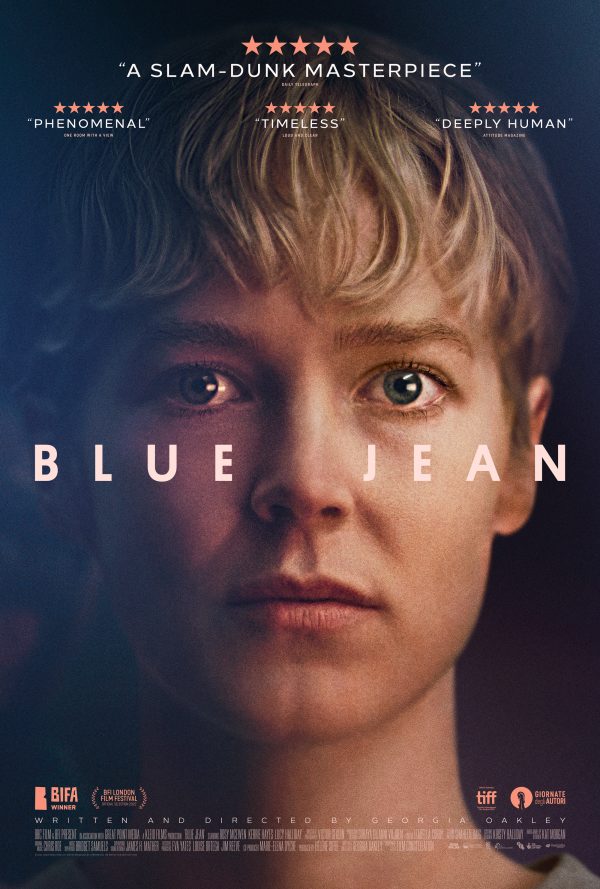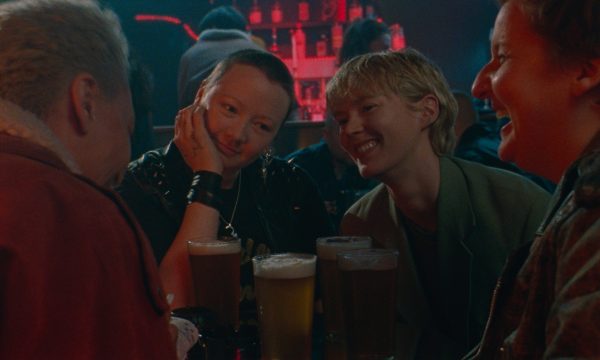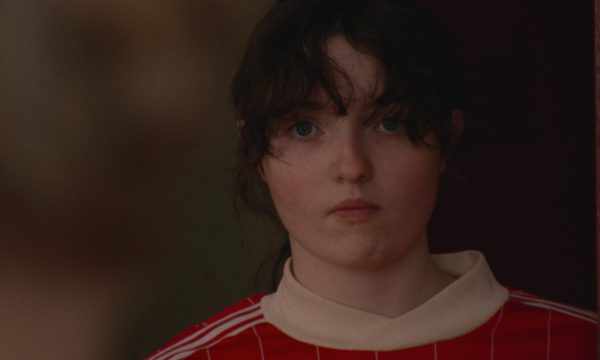
“Blue Jean” (2022 production, 2023 release). Cast: Rosy McEwen, Kerrie Hayes, Lucy Halliday, Lydia Page, Aoife Kennan, Amy Booth-Steel, Stacey Abalogun, Scott Turnbull, Dexter Heads, Lainey Shaw. Director: Georgia Oakley. Screenplay: Georgia Oakley. Web site. Trailer.
These circumstances were difficult to reconcile for many conflicted community members, such as Jean Newman (Rosy McEwen), a fictional phys ed teacher at an English secondary school. The divorced educator started a new life after leaving her husband, exploring her feelings for women and becoming involved in a passionate relationship with Viv (Kerrie Hayes), an outspoken advocate for LGBTQ+ rights. However, despite this blossoming romance, Jean has kept quiet about her status, especially at her job, the type of highly visible position that has become an easy target for those seeking to rein in gay and lesbian individuals, all in hopes that their sanctimonious efforts will curtail the potentially compromising and “promiscuous” behavior of these alleged social deviants. Jean would like to be more open about herself, but she knows that doing so could jeopardize her career, particularly with the Thatcher government’s initiative to pass Section 28, legislation aimed at prohibiting activities openly promoting homosexuality, a bill carrying wide-sweeping implications for the LGBTQ+ community. At the same time, however, laying low is also straining relations with Viv, given that she’s uninhibited about openly being herself – and wishes that Jean would be, too.
Jean is constantly reminded of her circumstances, too. In addition to the challenges of maintaining a low profile at work, she also struggles to do the same in her relations with relatives, such as her sister, Sasha (Aoife Kennan), her brother-in-law, Tim (Scott Turnbull), and her young nephew, Sammy (Dexter Heads). She’s often asked about why she divorced, as well as if there are any new men in her life, questions that she’s increasingly having trouble deflecting. But these issues are nothing compared to what she’s about to face.
When a transfer student arrives at Jean’s school, she has her suspicions about the new pupil. That speculation is soon confirmed when she spots the young woman, Lois (Lucy Halliday), at a gay bar one evening. Even though Lois is clearly under age, she nevertheless manages to pass for being old enough and fits right into the pub’s lively crowd. And, when Lois begins to behave in a flamboyant manner, Jean grows concerned. Despite efforts to maintain her distance, Jean pulls Lois aside and advises her to tone things down, fearing that she’ll become a target for the kind of scorn that’s surfacing more prevalently in British society. In doing this, however, Viv spies Jean’s actions and grows seriously upset. At first, Viv erroneously suspects that Jean is hitting on Lois, a prospect that hurts her feelings. But, when she finds out the real reason behind Jean’s behavior – that she’s actively encouraging Lois to hide her true self – Viv is even more disappointed, given that her partner is openly urging the young woman to deny her true feelings to herself, something that genuinely offends the activist’s sensibilities.

And this is just the beginning. Circumstances get further out of hand at school when Siobhan (Lydia Page), one of Lois’s mean-spirited classmates, skillfully attempts to entrap her in an alleged act of sexual assault in the girls’ locker room, an incident that Jean clandestinely witnesses – and about which she knows the truth. The event subsequently puts Jean in yet another dicey situation: How is she supposed to testify about what she saw when the girls are brought in for questioning by school authorities? She wants to protect Lois, but what is she supposed to say? Should she tell the truth, risking the reputations of both students? Or should she take a “protective” stance similar to what she advocated at the bar several nights before? But, more importantly, what will Jean’s actions in this case say about her strength of character and willingness to be herself? Both options represent potentially perilous paths, but what will she do? But, even more so, what should she do? And what will that mean for the future of her relationship with her family, her partnership with Viv and her employability as a teacher in an increasingly less tolerant society?
Circumstances like these have long hampered the growth and freedom of those in the LGBTQ+ community. That’s been especially true when society’s powerful elements have sought to hold back such individuals with the force of law and social ostracism, regardless of how unscrupulous and patently unfair such practices might be. But, by the 1980s, many of the community’s constituents began to fight back, efforts that brought about some initial reforms. At the same time, though, these efforts also generated a reactionary response among those seeking to preserve the status quo, as evidenced in this story.
Given these conditions, where is one supposed to stand? That all depends on one’s beliefs, and they’re important considering the role they play in the manifestation of one’s existence, a product of the conscious creation process, the philosophy that maintains these intangible resources are responsible for the reality we experience. It’s unclear how many of us are aware of this school of thought, but, in reviewing the evidence with regard to its viability, it becomes fairly clear that there’s an undeniable connection between the two.
This situation, however, poses a particularly powerful conundrum: Considering the forces at work here, what is one supposed to believe? It’s only natural to want to be yourself, but what if acting on that belief could get you fired from your job, disowned by your family, and/or shunned or ridiculed by society? Many would legitimately see those possible outcomes as powerful incentives to intentionally maintain a low profile.
But isn’t such an attitude giving license to a willfully exclusionary and discriminatory practice? Doesn’t it represent a fundamental compromise of one’s values? And doesn’t it undermine whatever progress has been made toward implementing needed reform and equalizing the prevailing circumstances? That’s certainly what many LGBTQ+ activists quietly believed for a long time – and what they were railing against when countermeasures were being effected to reverse the gains that the community had made at the time.

While Jean’s outlook is admittedly understandable, consider the costs of maintaining it. To begin with, it means upholding a fabricated façade that doesn’t represent her true self, putting forth a false reflection of her innate character. Then it carries potentially serious consequences for her relationship with Viv, given that there would be a fundamental disconnect between them and their respective beliefs about their lives and themselves. Keeping up such a front and sustaining a partnership that’s inherently unbalanced takes a lot of work. Is that something Jean could realistically do for the long term? And, even if she could, how happy could she be with such an arrangement? At some point, she’s bound to tire of having to artificially force such beliefs upon herself, and where would that leave her? Indeed, where would she stand in connection with her sense of personal integrity?
Ultimately, scenarios like this come down to a matter of choice when it comes to the beliefs to which we adhere. Granted, the choices involved may indeed be difficult, but we must nevertheless decide what we can live with and what would suit us best. Living a lie is rarely a workable option, something that Jean comes to see in rather short order in light of the fallout she experiences because of her choices. So it’s at that point where she has to ask herself, “Can I do this for the long run?” In cases like this, it often doesn’t take long to see how honesty really is the best policy, particularly when it comes to making decisions for ourselves, our lives and our future.
For the record, despite strong opposition by the UK’s LGBTQ+ community, Section 28 was successfully passed and implemented by the Thatcher government in 1988, forcing many organizations like student support groups to significantly curtail or cease operations at the time. However, with changing fortunes (and beliefs!) in the community and society at large in subsequent years, it was eventually repealed in Scotland in 2000 and in England and Wales in 2003. Overturning the law was a major victory for the LGBTQ+ community, proving that inspired beliefs, backed by zealous actions, can yield noble and noteworthy results. It opened the door for further LGBTQ+ reforms both in the UK and elsewhere. However, this sad chapter in the community’s history also serves as a cautionary tale to those who might be tempted to let their guard down, as evidenced by the emergence of pending anti-gay legislation in a number of US states. The LGBTQ+ community’s belief work must thus remain vigilant to avoid return trips down those outmoded paths, and this film provides a potent reminder of that.
It wasn’t all that long ago when the LGBTQ+ community not only didn’t have legal protections for its rights, but also faced blatant discrimination against its constituents. As “Blue Jean” illustrates, this was true even in supposedly “civilized” and “progressive” societies like those found in North America and Europe. Writer-director Georgia Oakley’s debut feature does a fine (if at times somewhat predictable) job of depicting the effects these conditions had on both the public and personal lives of these individuals, an effort that earned the film a 2022 BAFTA Award nomination for Best Debut by a British Writer, Director or Producer. Admittedly, the picture’s opening act meanders a bit, but, once it gets on track, when the emergence of various damning revelations threatens to blow things wide open, it steadily grows more powerful and heartfelt. These attributes are supported by the fine performances of the cast, solid writing, and its skillfully crafted cinematography and production design, fittingly enhanced by its ubiquitous atmospheric azure tones. It effectively shows us how Jean became so blue – and how we should seek to prevent the same from happening to the rest of us. The film is available for streaming online. Sensitive viewers should be cautioned about some strong sexual content.
Copyright © 2023, by Brent Marchant. All rights reserved.

No comments:
Post a Comment